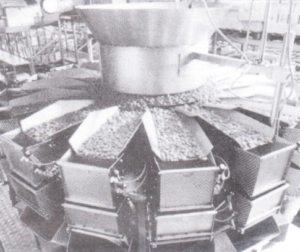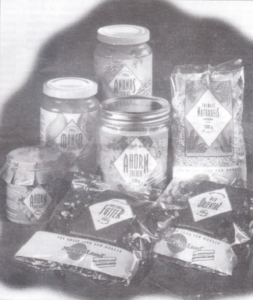The next time you nurse a fruit cocktail in an exotic bar in Paris or a regular pub in London, savour the taste carefully… If it is distinctive, full-bodied and somehow familiar, chances are that it has been imported from sunny Sri Lanka. That unmistakable tropical flavour has been preserved in its pristine, pure state and shipped across continents to Germany, to be dis- tributed through a network of wholesalers to health food shops and restaurants throughout Europe and the U.S. Morgen- land Lanka Pvt. Ltd. (MLPL), is the company in Sri Lanka spearheading this very enterprising business using the good offices of the parent company in Germany Morgenland Naturkost Handels GmbH (MNHG). Apart from the very dynamic man at the top, Mr. Kees Maris from the Netherlands, the company exclusively employs Sri Lankans for the entire operation.

What is significant about the company’s operation, apart from the fact that it is a guaranteed buyer at market rates for the produce of 1132 small farmers in Sri Lanka, is that the farmers are all educated in the basics, of organic farming by the company. Organic farming is by no means a sophisticated process, but it is one that is generally alien to local cultivators. Accepted methods of farming in the country incorporate the use of pesticides, fungicides and chemical-based fertilisers all short term options to increase yields and safeguard crops. Organic farming is strictly based on environment friendly methods in growing and using natural fertilisers like compost and manure. MNHG, has built its reputation exclusively on the environment friendly and naturally healthy substance of its imports.
Prior to the establishment of MLPL, Morgenland imported organically grown fruit and nuts from Turkey for export to other European countries and the US market.
Now, Sri Lanka has been added as another base to its operations, even though Mr. Kees Maris stresses, MLPL is a distinctly autonomous unit floated with a Sri Lankan partner under BOI terms and a certified supplier of organically grown fruit and food products to the German company. “It is a business relationship and we strive to maintain high standards of quality in our exports to meet the requirements of Morgenland, Germany”, he says.
What is important about the product is that it caters to a “health conscious” yet “taste conscious” consumer. The organic process safeguards the natural flavour of the fruit which Mr. Maris remarks, is “very exciting to the palate, perhaps even unfamiliar in most European countries where people are exposed to artificially enhanced flavours and tastes and fresh fruit in its natural glory is a rarity”. Sri Lankan fruit is somewhat special in terms of flavour, he feels, especially pineapple which has a tang that is totally unique.
MNGH has been importing dehydrated fruits, fruit chunks in fruit juices, fruit pulp, cashew nuts and desiccated coconut through the Sri Lankan company since 1994. However, it has mainly been on a pilot basis to test the EC (European Community) market reaction to Sri Lankan food products prior to the formal launch of the project. Processing and packaging was done by two established canning companies commissioned for this purpose. The market reception has been more than favourable and MLPL has now built a plant on a two acre site in the Kurunegala industrial zone which will be commissioned shortly. The factory can process 67,200 kilograms of vacuum dried fruit, 29.120 kilograms of fruit chunks bottles in juice and 179,200 cans of juice/ pulp per year.
The company currently exports bananas, papaya, mango and pineapple under the Morgenland label. Mango is a seasonal fruit while pineapple, papaya and banana generally grow in a relatively dry tropical climate such as Sri Lanka’s throughout the year. The company does not foresee any major problems in coping with contingencies such as crop failure or prolonged drought because of its extensive network of small holders who are scattered throughout the North-Western, Central and Uva provinces. In fact there are around 200 farmers for each fruit variety.

Educational programs for the farmers are ongoing. The head office staff, some of whom are agricultural scientists, have formulated special teaching programs which incorporate classroom teaching techniques, audio visual aids and hands-on practical field demonstrations in the practice of organic farming, in collaboration with the University of Peradeniya. The merits of this type of training are obvious. It is beneficial to the country in the long-term, as it is slowly supplanting traditional methods of farming in the rural areas. The farmers are now fully conversant with the benefits of organic farming. They understand that it is a positive step towards healthy eating habits as well as towards safeguarding the environment, remarks Mr. Sharm Weragoda, the Product Manager of MLPL. “The Morgenland label is synonymous with environmental and health consciousness. They even market and promote a range of organic clothing of pure cotton, that is, in its pristine form. The corporate culture of the company is to promote this type of product, somewhat like the Bodyshop range, which everyone knows is environmentally friendly.”
Organic farming methods have had their fair share of critics and advocates. Prince Charles, is one of the more militant defenders of this technique seeing it as one way to achieve sustainable development. In recent years consumers have begun to select their food on the basis of its ability to promote health rather than supply only nutrition or taste. MNHG has built its market on this growing trend in Europe catering almost exclusively to a high-income, health-consious upper class. Their awareness of organic products coupled with their purchasing power sets them apart. Sri Lankan fruits are considered exotic and as such command far higher prices on the supermarket shelves.
The EC market it has been observed, is particularly quality conscious where food is concerned and has as a result become inereasingly protectionist in its attitude to products from developing countries. Mr. Maris remarks, that it is a breakthrough that Sri Lankan fruit can find its way to supermarket shelves and breakfast tables across Europe in this scenario. Infact, EC regulatory authorities visit MLPL and the farming sites twice or thrice a year to determine whether EC standards are being met with effectively. It is not merely the growing method that is checked out but also the way of farming and processing. Bottled fruit, dried fruit and juices and pulps must carry comprehensive details of the contents on the label. The Sri Lankan fruits and nuts that are exported are not only eaten in their original form as healthy snacks, but also used for value addition to food products, such as muesli and breakfast cereal.
There is a conscious health food movement sweeping across Europe, particularly in Denmark, the Netherlands, Germany and the U.K. Consumers are more demanding, now that there is greater awareness of the harmful effects of modern farming and processing methods that use chemicals and artificial additives to increase yields, enhance taste and colour. Even the simple additives that one has lived with and which we believe are indispensable to provide a lengthy shelf life can be hazardous when consumed in large doses, whereas with organic farming and processing, a package of dehydrated fruit can last upto one year.
To Morgenland, the 342 million consumers who form the EC are separated not by only by cultural or national boundaries but by health-conscious and the not-so- health-conscious. “Consumer attitude is important”, stresses the Chairman, “Morgenland has built up a reputation for quality and this we hold sacred.” In fact, Mr. Maris is perhaps one of the few CEO’s to be involved in a project of this nature from grass-roots level. He was the first to see the potential of the country as far as the project was concerned and has single handedly worked towards making it a reality, spending roughly half his year in Sri Lanka supervising the operation. His personal interest is fuelled by the fact that he is an agriculturist by profession.
Sri Lankan fruit is somewhat special in terms of flavour… especially pineapple, which has a tang that is totally unique.
The local collaborator on the project Mr. KVP M Perera is also an agricultural expert, specialising in the field of biological soil conservation and has been a Consultant to the Integrated Rural Development Project in Nuwara Eliya.
The project will create nearly 57 direct employment opportunities to Sri Lankans. While Sri Lanka has been exporting fresh and processed fruit over the last two decades, organically grown and processed fruit exports have been limited. The country’s exposure has also been in most South East Asian countries where transportation is not difficult and regulations are not as stringent as in EC countries. Mr. Maris says, their operations are easy because the German company, Morgenland, already has a distributor network in place. The National Development Bank has supported the project with equity finance. The Manager handling the portfolio, Mr. Russell de Mel remarks, that it has helped introduce healthy farming practices throughout the country and build up the export of high value crops. “This way there won’t be any soil degradation or long- term environmental consequences. It will wean away the small-farmers dependence on primary agricultural produce which have very little demand outside. The bottom-line is that we don’t encourage investors to come in here to develop the country at any cost. It must be a quid-pro-quo arrangement. One of the conditions of the loan is that the project must have Central Enviromental Authority clearance”, he says.
Mr. Maris says this is only a beginning as far as the company is concerned. Since MLPL has Board of Investment status, it is limited to exporting its products but in the future the company may branch off into sales in the domestic market. “We also intend expanding our export base to include perhaps, passion fruit, waraka and other indigenous fruit. We are building a new generation of small-holders in the country, while exporting a taste of paradise’ to the world. The word Morgenland means ‘our land of Tomorrow’, that’s so apt because we are making sure Today, that Sri Lanka has a fruitful Tomorrow, he says, with a smile.


